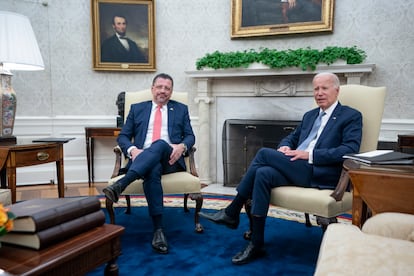Biden talks immigration and trade with Costa Rican President Chaves at the White House
The two talked about deepening U.S.-Costa Rica trade tries, creating new jobs and advancing democracy in addition to promoting a more orderly immigration process

President Joe Biden hosted his Costa Rican counterpart, Rodrigo Chaves, at the White House on Tuesday, discussing ways to strengthen an agreement between the two countries on possible legal pathways for the increasing numbers of Central American migrants arriving to the U.S. southern border.
The two talked about deepening U.S.-Costa Rica trade tries, creating new jobs and advancing democracy in addition to promoting a more orderly immigration process. Chaves’ nation has emerged as an immigration hotspot, as migrants increasingly travel through the dangerous Darien Gap from Colombia into Central America and north into Costa Rica.
Sitting down for the meeting in the Oval Office, Biden thanked Chaves for his leadership in helping meet “migration challenges that we face every single day,” and said that one of his key objectives was “deepening security cooperation” between their countries, including on organized crime.
“Our nations are not only united by the challenges we face but, what I’ve found Mr. President, we’re united by the vision we share,” Biden said. “A vision for a future of greater opportunity and freedom and equality and, quite frankly, dignity — dignity for all our people.”
In June, Costa Rica and the U.S. agreed to open potential legal pathways to the United States for some of the Nicaraguan and Venezuelan migrants who are among the 240,000 asylum seekers in the Central American nation. Last year, Nicaraguans accounted for nine out of 10 applicants.
Chaves said in December the policies were being abused by people looking only to come work and then leave, and the policies would be tightened. As an alternative, officials offered a two-year work permit for Nicaraguans, Venezuelans and Cubans in exchange for dropping their longer-term asylum cases.
The agreement was aimed at reducing the pressure on Costa Rica’s overwhelmed asylum system and heading off asylum seekers who could give up on the slow process in Costa Rica, and instead set off for the U.S.-Mexico border.
The U.S. is grappling with increasing numbers of migrants to the U.S.-Mexico border and clamped down on illegal crossings while offering expanded pathways following the end of pandemic-era restrictions at the border.
Chaves said at the start of Tuesday’s meeting that he agreed with Biden’s vision “where prosperity should be shared widely” but that “we have challenges to that sharing of prosperity, including security.”
“Costa Rica has been, and shall remain, one of the strongest allies in the world regarding your economic and security interests that are ours,” Chaves said.
Home to roughly 5 million people, Costa Rica is a popular destination for U.S. tourists but has faced increasing crime and murder -- blamed largely on violence related to drug trafficking. The nation, once a passthrough for drugs moving from South America to the U.S., is increasingly becoming an important hub — and there’s a growing domestic market, too. Chaves has promised an increase in police presence.
Speaking to reporters after the meeting, Chaves said the discussion lasted about an hour and 15 minutes and was “very productive.”
“We talked about immigration. We talked about the importance of understanding the nature of this phenomenon and managing it while we find solutions to the structural problems that are causing this migration: the problem of poverty, the lack of communities,” Chaves said. “This is going to take some time to solve, without a doubt. But, in the meantime, we have to mange the excessive abuses, particularly those that are happening in the Darien Gap heading north and Costa Rica.”
He did not directly answer a question about whether Costa Rica would consider closing parts of its border with Panama in an attempt to slow the flow of migrants, but said that the goal should be “managing” migration and that some of the people heading north had “legitimate” reasons for leaving their home countries.
Chaves said he and Biden also discussed trade, including ways for the U.S. to deepen its commercial relationships in Costa Rica and across Latin America. Since being elected last year, Chaves has expressed interest in Costa Rica joining the U.S.-Mexico-Canada Agreement.
The Biden administration has championed Costa Rica as a stable democracy at a time when threats to it have been on the rise in parts of Latin America. In March, the U.S. co-hosted the second Summit for Democracy with Costa Rica, as well as South Korea, the Netherlands and Zambia.
Asked after his meeting with Biden about the political turmoil in Guatemala, Chaves said he’d been distracted traveling in Washington and needed to discuss the situation more fully with his foreign minister but added, “We care about democracy.”
White House press secretary Karine Jean-Pierre said before the meeting that “one thing you’ll see is an even closer partnership between the two countries.”
Sign up for our weekly newsletter to get more English-language news coverage from EL PAÍS USA Edition
Tu suscripción se está usando en otro dispositivo
¿Quieres añadir otro usuario a tu suscripción?
Si continúas leyendo en este dispositivo, no se podrá leer en el otro.
FlechaTu suscripción se está usando en otro dispositivo y solo puedes acceder a EL PAÍS desde un dispositivo a la vez.
Si quieres compartir tu cuenta, cambia tu suscripción a la modalidad Premium, así podrás añadir otro usuario. Cada uno accederá con su propia cuenta de email, lo que os permitirá personalizar vuestra experiencia en EL PAÍS.
¿Tienes una suscripción de empresa? Accede aquí para contratar más cuentas.
En el caso de no saber quién está usando tu cuenta, te recomendamos cambiar tu contraseña aquí.
Si decides continuar compartiendo tu cuenta, este mensaje se mostrará en tu dispositivo y en el de la otra persona que está usando tu cuenta de forma indefinida, afectando a tu experiencia de lectura. Puedes consultar aquí los términos y condiciones de la suscripción digital.








































